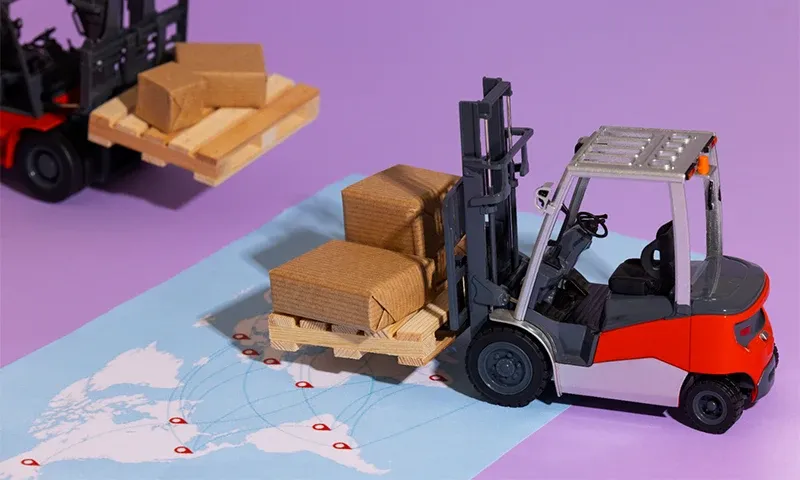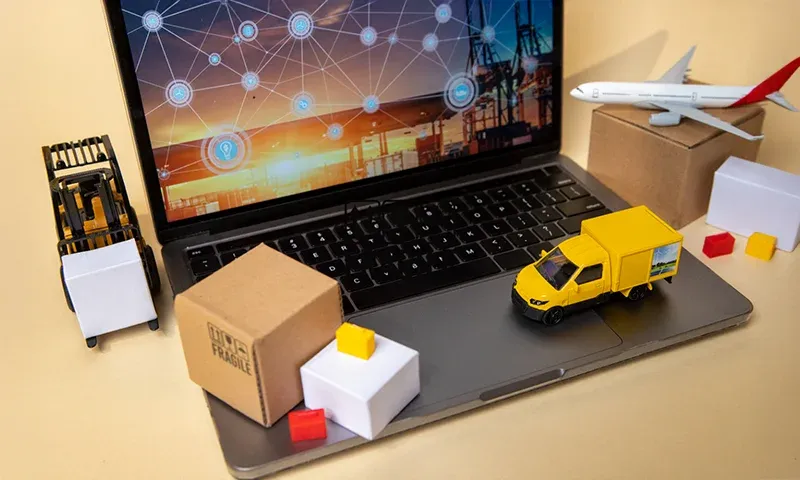The Future of Supply Chain: How Logistics Systems Are Revolutionizing E-Commerce
The rapid rise of e-commerce has fundamentally reshaped global supply chains, making logistics an essential element of the customer experience. Gone are the days when customers were content with slow delivery times and limited shipping options.

Today’s consumers expect faster, more reliable, and more transparent delivery services, often with next-day or even same-day shipping. This shift has placed intense pressure on businesses to rethink their supply chain and logistics strategies to stay competitive.
The key to meeting these rising expectations lies in the adoption of advanced logistics systems —integrated platforms that optimize and streamline every aspect of the supply chain, from order fulfillment to delivery and returns. These systems are transforming how e-commerce businesses manage inventory, plan deliveries, and ensure customer satisfaction.
In this blog, we’ll explore how logistics systems are revolutionizing the e-commerce supply chain, the innovations driving these changes, and what the future holds for logistics in e-commerce.
At their core, logistics systems are software platforms designed to manage and optimize the movement of goods within the supply chain. These systems integrate various functions such as inventory management, order processing, shipping, tracking, and returns. A comprehensive logistics system helps businesses coordinate and execute all logistics activities with greater efficiency and accuracy.
Modern logistics systems typically feature:
- Real-time inventory management to track stock levels across various warehouses and distribution centers.
- Advanced order management to streamline the order-to-fulfillment process, including routing, shipping, and tracking.
- Route optimization to reduce delivery costs and improve speed.
- Data analytics for forecasting demand, improving supply chain efficiency, and identifying areas for improvement.
These systems help businesses make smarter decisions, reduce operational costs, and deliver an enhanced customer experience, all of which are essential to thriving in the fast-paced world of e-commerce.
1. Faster and More Efficient Deliveries
One of the most significant impacts of logistics systems on e-commerce is the ability to provide faster and more reliable delivery options. With the rise of services like Amazon Prime, where next-day or even same-day delivery is expected, businesses must have a logistics strategy that can match these demands. Advanced logistics systems allow businesses to optimize their operations and improve delivery speed in several ways:
- Route optimization : By using sophisticated algorithms and data analytics, logistics systems can calculate the fastest and most cost-effective delivery routes. This helps reduce transit time and fuel costs, ensuring quicker deliveries to customers.
- Distributed warehousing : Logistics systems can help businesses manage multiple fulfillment centers strategically located near key customer bases. This allows businesses to fulfill orders more quickly and efficiently, reducing delivery times.
- Real-time tracking : Customers now expect to know exactly where their package is and when it will arrive. Logistics systems offer real-time tracking and notifications, giving customers transparency and peace of mind throughout the delivery process.
As e-commerce giants like Amazon set higher standards for delivery, smaller businesses must adopt similar logistics capabilities to remain competitive. Logistics systems make it possible for businesses of all sizes to meet these expectations.
2. Optimized Inventory Management
Efficient inventory management is at the heart of a successful e-commerce business. The ability to track inventory across multiple locations in real-time is critical to ensuring products are available when customers want them, without overstocking or incurring unnecessary costs.
Logistics systems enable businesses to:
- Track inventory in real time : By integrating with warehouse management systems (WMS), logistics platforms provide live data on stock levels, helping businesses avoid stockouts or overstocking.
- Automate replenishment : Based on historical sales data and demand forecasting, logistics systems can automatically trigger inventory restocking when stock levels fall below a threshold, ensuring continuous availability of popular products.
- Manage multi-location inventory : As e-commerce businesses expand, they often set up warehouses and fulfillment centers in various locations. A logistics system allows for seamless tracking of inventory across these different locations, ensuring products are allocated efficiently and shipped from the closest facility to the customer.
With better visibility into inventory levels and distribution networks, businesses can optimize their inventory, reduce waste, and avoid costly stockouts—while improving overall service levels.
3. Enhanced Order Fulfillment and Accuracy
Order fulfillment is a critical component of customer satisfaction, and mistakes in the process can lead to delayed shipments, wrong products, or poor experiences. Logistics systems streamline and automate key aspects of the fulfillment process to ensure greater accuracy and efficiency.
Key benefits include:
- Automated order processing : Logistics systems can automate order receipt, packaging, and shipping processes, minimizing the risk of human error and speeding up fulfillment.
- Batch and pick-and-pack optimization : These systems optimize picking and packing processes by grouping orders based on factors like shipping method or location, reducing time spent in the warehouse.
- Order routing : Logistics systems can dynamically route orders to the most appropriate fulfillment center, based on proximity, stock levels, and shipping times. This ensures faster deliveries and better utilization of warehouse resources.
These improvements not only reduce operational costs but also boost customer satisfaction by ensuring that orders are fulfilled quickly, accurately, and with minimal delays.
4. Sustainability and Green Logistics
As environmental concerns become increasingly important to both consumers and businesses, the need for sustainable logistics practices has grown. Logistics systems play a key role in helping e-commerce companies reduce their carbon footprint and adopt greener practices. Some of the ways logistics systems promote sustainability include:
- Route optimization for fuel efficiency : By calculating the most efficient delivery routes, logistics systems help reduce fuel consumption and greenhouse gas emissions, making deliveries more eco-friendly.
- Sustainable packaging : Logistics systems can help businesses track and implement sustainable packaging practices by ensuring the use of recyclable materials and optimizing packaging sizes to reduce waste.
- Consolidated shipments : Logistics systems can help consolidate shipments when possible, reducing the number of trips needed to deliver products and minimizing environmental impact.
As more consumers demand sustainable products and practices, businesses that prioritize sustainability in their logistics operations will not only improve their environmental footprint but also strengthen their brand reputation.
5. Improved Returns Management
Returns are a natural part of the e-commerce experience, but they can be costly and time-consuming if not managed efficiently. A good logistics system helps businesses handle returns smoothly, reducing friction for customers and minimizing operational costs.
Logistics systems help streamline returns by:
- Providing easy return labels and processes : With integrated returns management, logistics systems can generate return labels automatically and track the return process, making it easy for customers to return items.
- Optimizing return routes : Returns can be routed to the nearest returns center or warehouse to minimize the time and cost associated with returns processing.
- Analyzing return data : By tracking and analyzing return reasons and patterns, logistics systems can help businesses identify trends that may indicate problems with specific products, such as quality issues or inaccurate descriptions.
Efficient returns management not only enhances the customer experience but also helps businesses save costs and improve their product offerings.
As e-commerce continues to evolve, the role of logistics systems will only become more critical. Here are a few emerging trends that will shape the future of logistics in the e-commerce space:
1. AI and Automation : Artificial intelligence (AI) and machine learning will increasingly power logistics systems, offering even more sophisticated forecasting, route optimization, and inventory management capabilities.
2. Last-Mile Delivery Innovations : The “last mile”—the final leg of the delivery journey—remains one of the most costly and challenging aspects of logistics. Innovations like drones, autonomous delivery vehicles, and smart lockers are set to revolutionize how goods are delivered to customers’ doorsteps.
3. Blockchain for Transparency : Blockchain technology may soon be used to create transparent and tamper-proof supply chains, improving visibility into every stage of the logistics process and reducing fraud or inefficiencies.
4. 5G Technology : The advent of 5G will enable faster data transfer and real-time communication between logistics systems, warehouses, and delivery vehicles, improving operational efficiency.
The future of logistics in e-commerce is bright, with continuous advancements in technology driving greater efficiency, sustainability, and customer satisfaction.
Logistics is the backbone of any successful e-commerce operation. As consumer expectations continue to rise, businesses must adopt sophisticated logistics systems to stay ahead of the competition and deliver superior customer experiences. From faster deliveries and optimized inventory to sustainability initiatives and streamlined returns management, logistics systems are revolutionizing the e-commerce supply chain.
By embracing these innovative technologies and strategies, businesses can not only meet the demands of today’s e-commerce landscape but also position themselves for success in the future. As logistics systems continue to evolve, the potential for efficiency, cost savings, and enhanced customer satisfaction is boundless—transforming logistics from a simple operational function to a strategic advantage in the world of e-commerce.








